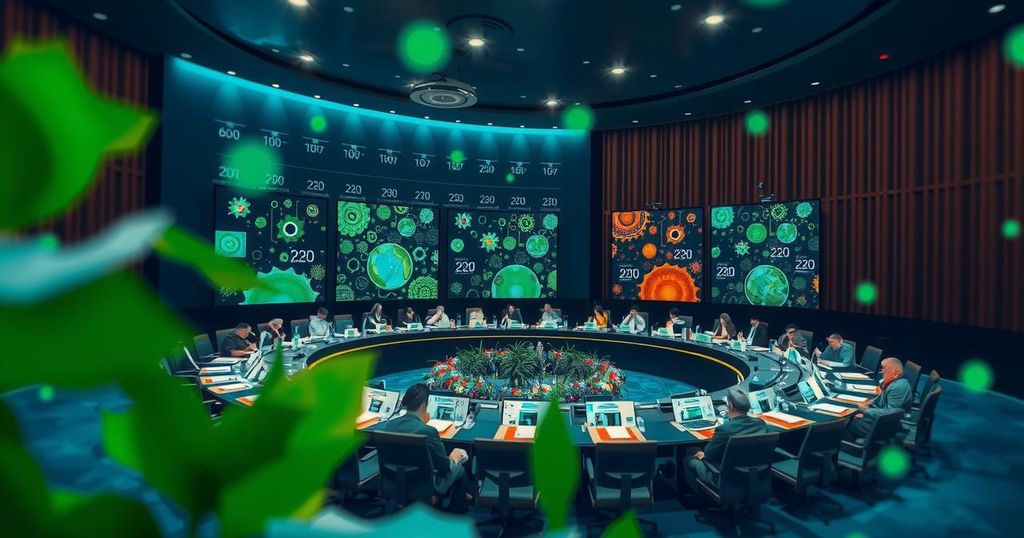G20’s Focus on Bioeconomy: Balancing Development and Sustainability in the Face of Climate Change
The G20’s recent discussions on Bioeconomy established voluntary principles aimed at reconciling economic development with sustainability, emphasizing nature-based solutions to combat climate change. Brazil spearheaded these efforts, proposing a National Strategy for Bioeconomy that underlines the importance of integrating indigenous perspectives and fostering international cooperation. Everyday actions contribute to the Bioeconomy, reflecting individuals’ roles in this global initiative.
At the recent G20 summit, member nations established guidelines aiming to balance development and sustainability through nature-based solutions, a central focus of this year’s Forum. The G20 Bioeconomy Initiative, championed by Brazil, sought to address the pressing challenges of climate change, evidenced by extreme weather events such as record temperatures, wildfires, and flooding. Bioeconomy is defined as an economic framework that prioritizes environmental protection alongside development, utilizing renewable biological resources to replace fossil fuels and reduce ecological damage. Everyday actions, such as recycling packaging, reusing bottles, or opting for biodegradable clothing, reflect individual contributions to the Bioeconomy. During the final Bioeconomy meeting in September in Rio de Janeiro, representatives adopted the “Ten voluntary and non-binding High-Level Principles on Bioeconomy.” Key proposals include incorporating indigenous perspectives into discussions, facilitating the exchange of best practices globally, developing methodologies for sustainability assessment across value chains, and fostering the restoration of degraded ecosystems. Although these principles are non-binding, G20 members have collectively endorsed their implementation. Currently, bioeconomy accounts for 25% of Brazil’s Gross Domestic Product, as reported by the Getulio Vargas Foundation. In August, Brazil announced a National Strategy for Bioeconomy to establish guidelines in this field, as well as a forthcoming National Plan aimed at encouraging bioindustrialization initiatives. Discussions at the G20 are organized around three key themes: Science, Technology, and Innovation for the bioeconomy; the sustainable utilization of biodiversity; and the bioeconomy’s potential in fostering sustainable development. These initiatives strive to harmonize development goals with sustainability objectives and cumulative traditional knowledge. Marina Silva, Brazil’s Minister of Environment and Climate Change, emphasized the importance of an intersectional approach to Bioeconomy, integrating various governmental sectors rather than solely relying on environmental ministries. She pointed out that the absence of unified international standards impedes collaborative global efforts, which could significantly advance an ecological transition. Minister Silva asserts that promoting the Bioeconomy necessitates actionable strategies from governments, supported by cooperative global frameworks to establish a new model of development.
The discussion surrounding Bioeconomy is increasingly pertinent as nations grapple with the realities of climate change and its impacts on daily life. The G20 Bioeconomy Initiative represents a concerted effort among the world’s largest economies to cultivate solutions that leverage nature for sustainable growth. Bioeconomy integrates economic objectives with environmental stewardship, advocating for the use of renewable resources in lieu of environmentally harmful fossil fuels. This dual focus on ecological health and economic viability is vital for confronting the challenges posed by climate change and establishing a sustainable future.
In conclusion, the G20’s commitment to the Bioeconomy marks a significant step towards integrating sustainable practices into economic development. While the principles established during the discussions are voluntary, their collective adoption by member states reflects a recognition of the urgent need for coordinated responses to climate-related challenges. As Brazil leads initiatives in this arena, it exemplifies the potential for national strategies to influence global sustainability efforts. Therefore, individuals can play an essential role in advancing the Bioeconomy by embracing sustainable practices in their everyday lives.
Original Source: www.g20.org




Post Comment